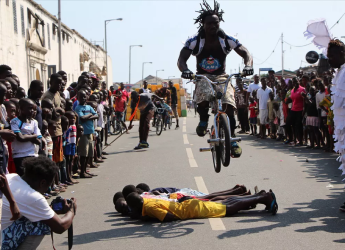New institutional narrative knowledge models rooted in Indigenous Ecologies
The word ANO comes from Ɛno which, in the Twi or Akan language of Ghana, means Grandmother, who is often the fount of cultural knowledge in our communities. It also comes from the suffix -ano in Esperanto which denotes belonging when added to a word.
Vision
ANO’s vision is connected to notions within cultural knowledge like that of Sunsum, the spirit that animates all things, including humans, nature, and even objects, and in which everything is interconnected and interdependent.
Mission
ANO’s mission is to ensure this way of being belongs as much to the canon, languages, and ecologies of world knowledge as any other; and that it brings back balance to the singular way of being and knowing that has become so dominant in the world, and that has created so much separation from ourselves, each other, and our environment.
History
ANO was started in 2002 by Nana Oforiatta Ayim, in order to bring the notion of interconnected and interdependent expression to the centre and forefront of cultural practice. Since then ANO has created exhibitions such as the Ghana Pavilions at the Biennale di Venezia 2019 and 2022; engaged in artists’ development, such as the first exhibitions of veteran photographs Felicia Abban and James Barnor, as well as of younger artists, such as Ibrahim Mahama and Serge Attukwei Clottey; put on events such as the Sunsum sessions opening up conversations around and between food, design, fashion, architecture, literature, music, film; initiated workshops around living archives and future museums; set up fellowships for the next generation of young leaders in culture; and pioneered projects in experimental museology, such as the Mobile Museum; and in forward-thinking archive-making such as the Cultural Encyclopaedia.
Present
Since 2022, ANO has worked with indigenous knowledge systems that has led to creating new narrative, institutional and knowledge models inspired by Akan technologies: the Ayan, Afahye, and Adae. It is working on new narrative models, such as the Cultural Encyclopaedia, inspired by the Ayan, drum poetry, which is allusive, elliptical, and cyclical, and in which what is left out is as important as what is pronounced. It is also working on new museum models, inspired by the Afahye, which are ceremonies that are total works of art that encompass the interconnection of art, music, design poetry, performance, ritual and remembrance. It is creating new knowledge models, such as our regenerative education output inspired by Adae, which are days of rest, during which knowledge was passed on from the older generation to the next.
Future
Future projects are focused on reparation and healing across borders, through the setting up of bases across Africa and its Diasporas working on the Pan-African Cultural Encyclopaedia; Research Fellowships that interrogate the past in the present, by investigating the separation of people from each other by unearthing the hidden archives of slavery forts and castles, and the separation from objects through their abduction into museum spaces; the basis of IKS for forest conservation, biodiversity and eco museums; and finally the development of new curricula. This will feed into ANO’s educational initiatives, including our online, training, school and further education outputs.















